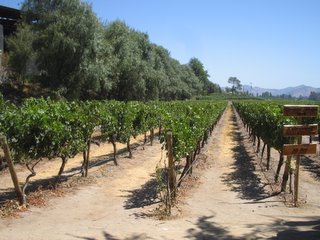Vina Concha y Toro

TGIF
What a long week! Its official, we are done with two out of three weeks of our intensive language program. Tomorrow morning we take off for another excursion to the beach, this time to smaller villages called Santo Domingo and Cartagena. It should be interesting to compare/contrast them with our experiences in Valparaiso and Vina del Mar last weekend.
Thursday we went to the "WORLD RENOWNED" vineyard Concha y Toro. It was absolutely gorgeous, but almost felt a bit like Disneyland in its perfection. The wine was pretty good, although Im not a huge Cabernet fan. It was nice to get out of the crowded city and escape the constant noise of traffic. Its amazing that just twenty minutes away lies such beautiful terrain and refreshing silence.
After more than two weeks, I have come to love some things about Santiago. Firstly, the empanadas...or rather the food in general. In the U.S., there doesnt exist a good meal in the 1-2 dollar range. Here, its standard practice. And whats GREAT is that the food is not sketchy (knock on wood). Walking down the street, there are little tiendas with signs for empanadas and humitas (like tamales, but no meat filling, just choclo--corn). For 900 mil pesos, which is about $1.50, you can buy an empanada, humitas, AND a drink. Que Pulento (cool!)!
Secondly, I love the history, and the fact that walking down the street there are signs of it EVERYWHERE. Santiago was founded by an indigenous group called the Mapuches. It was an ideal location for a settlement--there was a river that provided substantial water and there were two hills that could be used as "look-outs" for intruders. These two hills, now called Cerro Santa Lucia and Cerro San Cristobal, have been fully incorporated into the city and are constant reminders that this huge city used to be but a small pueblo of Mapuches.
What is increasingly interesting is that lack of anyone wanting to claim their indigenous heritage. The apellido (last name) can generally indicate any ties to the Mapuche, Aymara, or Rapanui peoples, and because of this some people have changed their names. There is this constant desire to be as European as possible--you can see it not only in the desire to change names, but also in the fashion trends here. The architecture, as well, screams with trends of Victorian England. As a whole, this country is undergoing (in my opinion) an identity crisis that is so interesting to observe after having studied a bit of the political history.
Along these lines, any of you interested in a really good movie or if you just want to practice your spanish listening skills (or caption reading skills), check out the movie Machuca. Its actually about the military coup in September of 1973 from the perspective of two youngs boys. From what I have studied, it is very comprehensive and accurate, and gives a little glimpse of humanity that is more interesting than reading a history book (and a glimpse of my campus, where it was filmed!).
I hope this finds you all well, and that you found my comments slightly interesting. I'm sure at the end of these six months I will have even more viewpoints to share and history lessons to give.
Take care and Happy Friday!
chau chau,
Beth O.
P.S. Highlight of today: Im on the bus with two girls headed to the bank when, from behind me, a man starts whistling. What song was he whistling, you might ask? "Take myyyy hand...take my whole heart tooooo...cause I...cannnt....helpp....falling in love...with...you"---hilarious.

1 Comments:
I read about you in http://www.lun.com/modulos/catalogo/paginas/2006/02/19/LCTP11RE1902.htm?tipoPantalla=1024
!!!!!!!
and now Im here reading about my country. Very funny. Loved your blog
Santiago was founded by a spanish conqueror called Pedro de Valdivia. If you want to read about, there is a letter of Pedro to the King (Carlos V) in "cerro santa lucía" (in a little stone...)
In Santiago the indigenous group were called Picunches not mapuches...ok i will explain this...
- north of Itata river (VIII región del Biobío) = Picunches ("gente del norte")
- Itata to Toltén (IX región de la Araucanía) = Mapuches ("gente de la tierra)
- SOuth of Toltén to Pto Montt = Huilliches ("gente de la tierra")
- in the mountain of the VIII región = Pehuenches ("gente del piñón" cause they ate the fruit of the Araucaria, a typical tree)
all of them spoke the same language
Post a Comment
<< Home